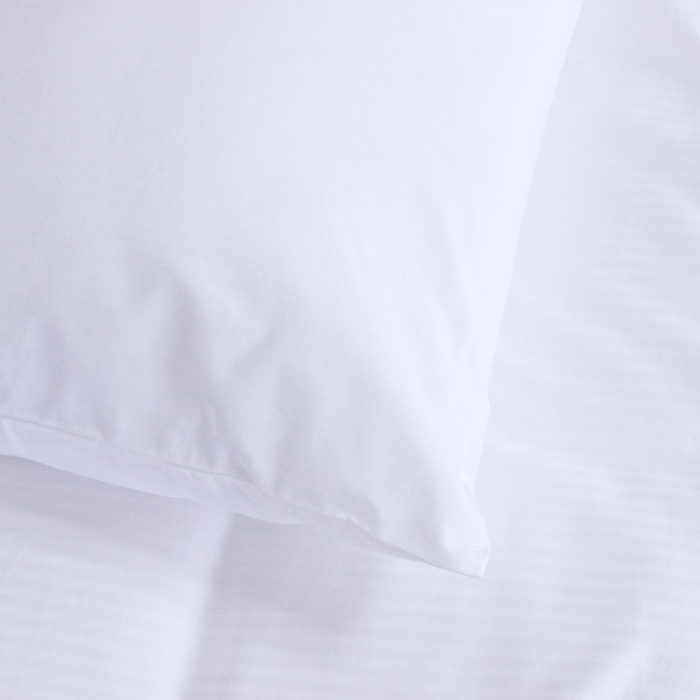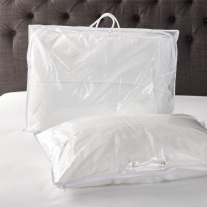We use cookies to give you the best possible experience. To accept cookies continue browsing, or view our Cookies Policy to find out more.
V Polycotton Percale Pillow Protector
Our polycotton pillow protectors are woven from 180 thread count polycotton blend, giving added comfort and protection to the pillows you've invested in.
Want to use these protectors on your pillows at home? Check out this same product on VisionLinensHome.com, our dedicated consumer website.
Our polycotton pillow protectors are woven from 180 thread count polycotton blend, giving added comfort for hotel guests. Ideal for increasing the life of your pillows, our protectors work to keep spills and stains at bay.
Available in zip style, they provide added protection and peace of mind for hoteliers, care environments and any other business where bedding is used. Fully machine washable.
Available in standard (51 x 76cm), king (53 x 94cm), and Euro (68 x 68cm) sizes.
| Size | Standard - 51 x 76cm King - 53 x 94cm Euro - 68 x 68cm |
|---|---|
| Features | Machine Washable |
| Material | Polycotton |
| Brand | Vision |
| Thread Count | 180 |
| Design | Zip |
Cotton/Polyester Blend Wash Guide
Our wash instructions are only a guide and might not be suitable for the care process you require. Please contact us if you are not sure about any of the information provided below. For more tips on how to care for our products see our laundry advice guide.
- The first 4 to 5 minutes of the wash process should be carried out with a temperature below 40C to prevent setting any protein stains.
- The wash temperature can then be increased to 60C for white items or 70C should the soiling be cooking oil or grease based to encourage emulsification.
- If polyester/cotton is washed at 60C or above, a cool-down stage must be included between the high-temperature wash and cold temperature rinsing. The wash liquor temperature should reduce to 50C and a rate of approximately 4C per minute.
- High-temperature washing without a sufficient cool-down stage can result in Thermal Shock Creasing. This occurs when hot, soft and pliable polyester fibres are cooled too quickly whilst in a crumpled state. This results in small "broken ice" type creases on the fabric surface.
- Wash loads should be classified according to colour and soiling level.
- White items should be washed separately to prevent cross-contamination from coloured items.
- Do not wash with 100% cotton/100% polyester goods.
- Detergents containing optical brightening agents will improve the visual brightness of white polyester/cotton goods.
- For coloured goods, use a detergent that does not contain any optical brightening agents as this will mask the true shade and diminish the colour.
- Residual staining can be removed using oxygen-based bleaching agents but these should not be substituted for a good wash process with adequate detergency. Care and attention should be given to the conditions of use.
- Stain removal using Chlorine bleach (Sodium Hypochlorite) will chemically damage and accelerate the weakening of cotton fibres in the blend. Over/repeated use will cause the cotton fibres to degrade leaving a thin, shiny fabric due to the remaining polyester. On coloured items, Chlorine bleach will cause permanent colour loss/shade change and should be avoided.
- Natural or less commonly synthetic starches can be applied to poly/cotton linen to impart polish and stiffness where required. Starching should take place on the final water-based stage of the wash process after the fabric has been cleaned and all wash chemicals neutralised.
- Ironing should be done whilst damp to complete the drying process.
- Higher ironer bed temperatures (above 170C) on modern machinery can cause softening and distortion of polyester if consistently ironed in the same direction. Altering the direction of feed after each wash will minimise this effect if possible.
Questions?
Have questions about our products? Contact us or use our handy live chat service.
Membership Benefits
Don't forget, you can earn reward points on every purchase when you create a free account. Sign-up here!






